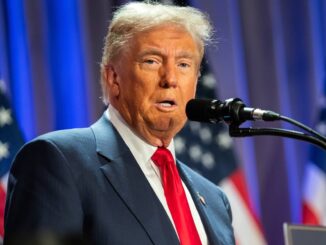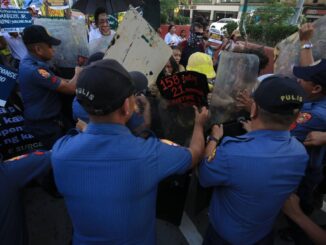
WITH or without a law, the Commission on Elections (Comelec) will issue guidelines regulating the use of certain forms of artificial intelligence (AI) in the 2025 elections, Comelec Chairman George Erwin Garcia said on Thursday.
Garcia said consultations are ongoing with experts on AI and other election stakeholders to determine the kind of AI would be allowed in the elections.
“I don’t like to preempt the result of this [ongoing] forum [on AI] but whatever it will be, the Comelec will push through with our guidelines based on the outcome of our discussions,” he said.
Commission on Elections (Comelec) Chairman George Erwin M. Garcia gestures during the ‘Press Conference with the Chairman, Commissioners and Senior Officials in Manila, on July 17, 2024. PHOTOS BY MIKE ALQUINTO
He said the Comelec is ready to defend its decision in court, citing that the commission has “the power and authority” to regulate on limited terms.
“We have that rule making power. It is stated in Republic Act 9006 or the Fair Elections Act that we can regulate other forms of media, other forms of information dissemination. Comelec can’t be helpless during elections,” he said.
Garcia said the Omnibus Election Code (OEC) also provides that violation of Comelec rules and regulations shall be considered as an election offense.
The use of AI deepfakes, he pointed out, is a misrepresentation of facts, hence an election offense.
“Even if it is not stated in Section 261 of the OEC but it is in the guidelines or regulations, we can say that said violation is an election offense,” Garcia said.
He made it clear that the Comelec would not totally ban the use of AI, only some parts of it.
The commission will also determine the punishment violators face.

Commission on Elections (Comelec) Chairman George Erwin M. Garcia gestures during the ‘Press Conference with the Chairman, Commissioners and Senior Officials in Manila, on July 17, 2024. PHOTOS BY MIKE ALQUINTO

Commission on Elections (Comelec) Chairman George Erwin M. Garcia gestures during the ‘Press Conference with the Chairman, Commissioners and Senior Officials in Manila, on July 17, 2024. PHOTOS BY MIKE ALQUINTO

Commission on Elections (Comelec) Chairman George Erwin M. Garcia gestures during the ‘Press Conference with the Chairman, Commissioners and Senior Officials in Manila, on July 17, 2024. PHOTOS BY MIKE ALQUINTO

Commission on Elections (Comelec) Chairman George Erwin M. Garcia gestures during the ‘Press Conference with the Chairman, Commissioners and Senior Officials in Manila, on July 17, 2024. PHOTOS BY MIKE ALQUINTO

Commission on Elections (Comelec) Chairman George Erwin M. Garcia gestures during the ‘Press Conference with the Chairman, Commissioners and Senior Officials in Manila, on July 17, 2024. PHOTOS BY MIKE ALQUINTO

Commission on Elections (Comelec) Chairman George Erwin M. Garcia gestures during the ‘Press Conference with the Chairman, Commissioners and Senior Officials in Manila, on July 17, 2024. PHOTOS BY MIKE ALQUINTO

Commission on Elections (Comelec) Chairman George Erwin M. Garcia gestures during the ‘Press Conference with the Chairman, Commissioners and Senior Officials in Manila, on July 17, 2024. PHOTOS BY MIKE ALQUINTO

Commission on Elections (Comelec) Chairman George Erwin M. Garcia gestures during the ‘Press Conference with the Chairman, Commissioners and Senior Officials in Manila, on July 17, 2024. PHOTOS BY MIKE ALQUINTO

Commission on Elections (Comelec) Chairman George Erwin M. Garcia gestures during the ‘Press Conference with the Chairman, Commissioners and Senior Officials in Manila, on July 17, 2024. PHOTOS BY MIKE ALQUINTO

Commission on Elections (Comelec) Chairman George Erwin M. Garcia gestures during the ‘Press Conference with the Chairman, Commissioners and Senior Officials in Manila, on July 17, 2024. PHOTOS BY MIKE ALQUINTO

Commission on Elections (Comelec) Chairman George Erwin M. Garcia gestures during the ‘Press Conference with the Chairman, Commissioners and Senior Officials in Manila, on July 17, 2024. PHOTOS BY MIKE ALQUINTO

Commission on Elections (Comelec) Chairman George Erwin M. Garcia gestures during the ‘Press Conference with the Chairman, Commissioners and Senior Officials in Manila, on July 17, 2024. PHOTOS BY MIKE ALQUINTO

Commission on Elections (Comelec) Chairman George Erwin M. Garcia gestures during the ‘Press Conference with the Chairman, Commissioners and Senior Officials in Manila, on July 17, 2024. PHOTOS BY MIKE ALQUINTO

Commission on Elections (Comelec) Chairman George Erwin M. Garcia gestures during the ‘Press Conference with the Chairman, Commissioners and Senior Officials in Manila, on July 17, 2024. PHOTOS BY MIKE ALQUINTO
“What is important here is that Comelec is consulting first with stakeholders and experts on the matter, because AI is a fast changing new technology and, as such, we should always have a proactive stand when it comes to the issue of AI and other technology,” said Garcia.
He said that based on his personal observation, the real problems facing AI are misinformation, disinformation and deep fakes directed against a candidate or political party.
“The abuse of AI technology and ‘deepfake’ videos undermines the integrity of elections and the credibility of public officials, candidates, and election management authorities, The abuse of this technology in campaign materials… or other media forms may amount to fraudulent misrepresentation of candidates,” Garcia said.
The election watchdog Legal Network for Truthful Elections (Lente) has called on Comelec to approach its plan with a balanced perspective to avoid inciting unnecessary fear.
Lente said that while it recognizes that the advancements in AI were being misused to peddle disinformation within the context of elections, it also acknowledges the impossibility or impracticality of banning AI altogether, considering how deeply integrated it is into the infrastructure of modern society.
“Lente believes that it is more feasible to focus on developing robust ethical guidelines and/or regulatory frameworks that ensure AI is used responsibly during elections,” it said in a statement.
Lente proposed that the Comelec conduct rigorous social media monitoring, citing the poll body’s own media monitoring project for the 2022 national and local elections where it found that the bulk of disinformation on social media, which primarily endorse a candidate, regardless of whether they are directly managed by the candidate or their campaign staff.
“Social Media Monitoring revealed that most disinformation posts on these pages had an average engagement of 1,000 or fewer, highlighting how such posts can evade fact-checkers while still reaching unsuspecting users,” it said.
An AI ban, it added, would require the same level of rigorous social media monitoring by the Comelec on the proper usage of AI.
Lente said it believes “a ban alone would not prevent content creators from using generative AI for disinformation, which could still evade detection.”







Be the first to comment